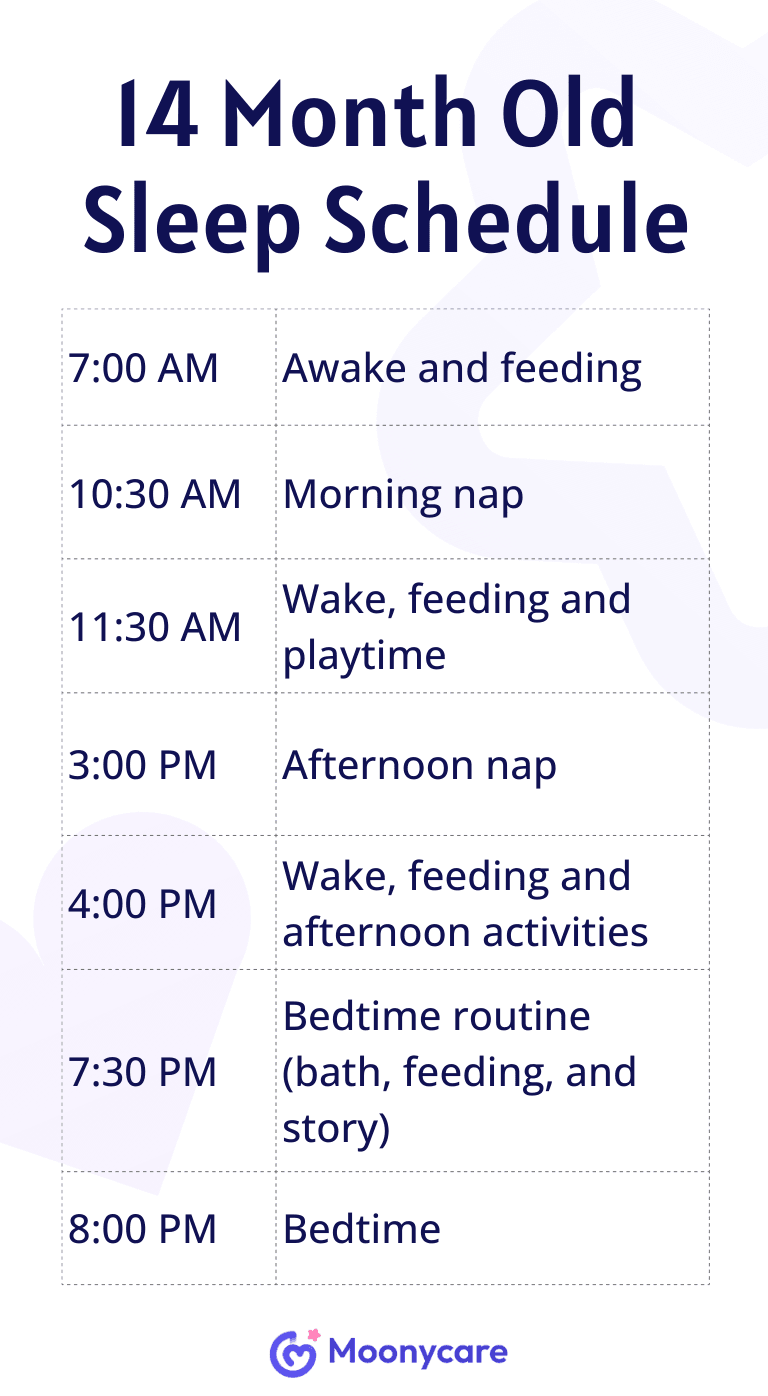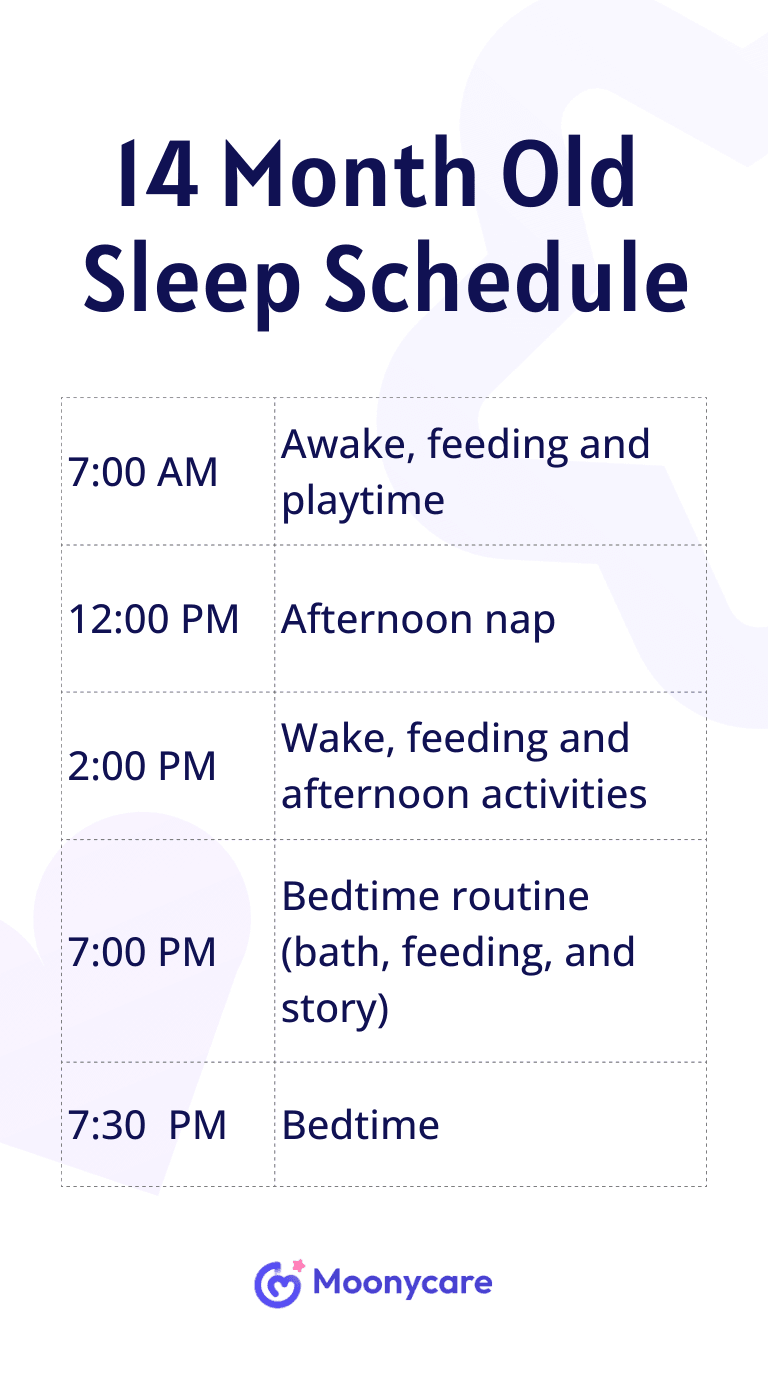

As your baby grows into a toddler, their sleep needs and patterns will evolve. At 14 months, your child is likely more active, curious, and eager to explore their environment, which can significantly impact their sleep schedule. Balancing their need for adequate rest with their increasing desire for independence can be challenging, but with the right strategies, you can help your baby get the sleep they need for healthy growth and development.
It may challenging for you to figure out what is best for your baby. So you can turn to our Moonycare app, which is able to customize sleep schedule based on your babies' sleep cycle, allowing you to keep a healthy sleep routine effortlessly.
IN THIS ARTICLE:
What are Wake Windows for a 14 Month Old?
A Sample Sleep Schedule for 14 Month Old Babies
How Much Should a 14 Month Old Sleep?
How Long Should a 14 Month Old Nap?
How Many Naps are Suitable for a 14 Month Old?
Why is my 14-Month-Old Refusing Naps?
What Time Should a 14-Month-Old Go to Bed?
Can a 14-Month-Old Baby Sleep Through the Night?
Can you Sleep Train a 14-Month-Old?
Is there Sleep Regression for 14 Month Old Babies?
What are Wake Windows for a 14-Month-Old?
Good wake windows can help to balance periods of activity and rest, preventing overtiredness and ensuring quality sleep. At this age, wake windows varies depending on your child's individual sleep needs and overall activity levels. For babies who still need 2 naps, wake windows generally ranges between 3.5 to 4 hours. For babies who only need 1 nap, it will be prolonged to around 4-6 hours.
Two-nap wake windows guide:
-
Morning Wake Window: Approximately 3 hours after waking up.
-
Afternoon Wake Window: About 3.5 to 4 hours after the first nap.
-
Evening Wake Window: Around 4 hours before bedtime.
One-nap wake windows guide:
-
First Wake Window: Approximately 5 to 6 hours after waking up in the morning.
Sample 14-Month-Old Sleep Schedule
Here is a sample schedule that balances sleep and awake times, helping your child to stay energized and well-rested.
Two-Nap Schedule:

One-Nap Schedule:

Be flexible to the schedule, as long as your baby can balance well with sleep and wakefulness in his/her own pace.
How Much Should a 14-Month-Old Sleep?
A 14-month-old typically needs around 12 to 14 hours of sleep over a 24-hour period. This includes approximately 10 to 12 hours of nighttime sleep and 2 to 3 hours of daytime naps, ensuring they get the rest necessary for their rapid growth and development.
How Long Should a 14-Month-Old Nap?
At this age, toddlers generally take two naps per day, each lasting between 1 and 1.5 hours. The total nap time should ideally be 2 to 3 hours daily. But for some babies, they can meet this duration by only 1 long nap. Ample nap helps them maintain their energy levels and mood throughout the day. It's important to monitor your child's nap lengths and adjust them based on their individual needs and activities.
How Many Naps are Expected for a 14-Month-Old?
Most 14-month-olds still benefit from two naps each day. However, some may begin to transition to one nap. If your child consistently refuses the second nap or manages well with one longer nap, they may be ready for this transition. Pay attention to your toddler's behavior and mood to determine if they are getting adequate rest with one nap.
Why is my 14-Month-Old Refusing Naps?
There are several reasons why a 14-month-old might refuse naps, including developmental milestones, separation anxiety, being overtired, or demanding for more awake time. To address this, you can ensure a consistent nap routine, create a calm pre-nap environment, and adjust wake windows as needed. Sometimes, nap refusal is a sign that your child is ready to drop a nap or needs a slightly adjusted nap time.
What Time Should a 14-Month-Old Go to Bed?
Ideally, a 14-month-old should go to bed between 7:00 and 8:00 PM. This bedtime aligns with their natural circadian rhythms and helps ensure they get enough nighttime sleep. If your toddler has trouble falling asleep or wakes up too early, consider making slight adjustments to their bedtime.
However, if your baby doesn't follow the bedtime at this range, but he still goes on a great nighttime, you can ignore it and still carry out the activities as your baby usually does.
Can a 14-Month-Old Baby Sleep Through the Night?
Yes, many 14-month-olds can sleep through the night with adequate feeding before bedtime. However, each child is unique, and some may still wake occasionally due to hunger, teething, discomfort, or developmental milestones. Consistent sleep routines and training can help encourage longer stretches of uninterrupted sleep. Sometimes, a slight adjustment in the sleep schedule can help resolve frequent night wakings.
Sleep Train a 14-Month-Old
Sleep training can help your child raise a more healthy sleep habits and learn to fall asleep without other's comfort. Here are a few common methods:
-
Cry It Out (CIO): Letting your child cry for a set period before offering comfort. This method can be challenging but effective if applied consistently.
-
Ferber Method: Gradually increasing the time you let your child cry before soothing them. This method allows for gradual adjustment and can be less distressing for parents and children alike.
-
Gentle Sleep Training: Gradually reducing your presence in the room as your child falls asleep. This can involve sitting by the crib and slowly moving further away over several nights.
Choose a method that aligns with your parenting style and be consistent in its application. Remember that each child is different, and what works for one may not work for another.
Sleep Regression of a 14-Month-Old
Sleep regression is common at this age due to separation anxiety and developmental changes. Signs include increased night wakings, difficulty falling asleep, and shorter naps. To manage sleep regression, maintain a consistent sleep schedule, offer comfort as needed, and be patient as your child adjusts. Sleep regression is typically temporary and often coincides with significant developmental milestones.
14-Month-Old Sleep Tips
Promote healthy sleep habits with these tips:
-
Consistent Routine: Establish a predictable bedtime and nap routine. Routine helps your child understand when it's time to wind down and sleep.
-
Sleep Environment: Create a dark, quiet, and cool sleep environment. A consistent and conducive sleep environment can significantly improve sleep quality.
-
Limit Stimulants: Avoid stimulating activities and screen time before bed. Calm, relaxing activities such as reading or gentle play are better suited for pre-sleep time.
-
Comfort Items: Introduce a lovey or blanket for comfort. Familiar comfort items can help your child feel secure and ready for sleep.
-
Positive Sleep Associations: Encourage self-soothing techniques, such as a pacifier or thumb-sucking. Positive sleep associations help your child fall asleep and stay asleep.
























